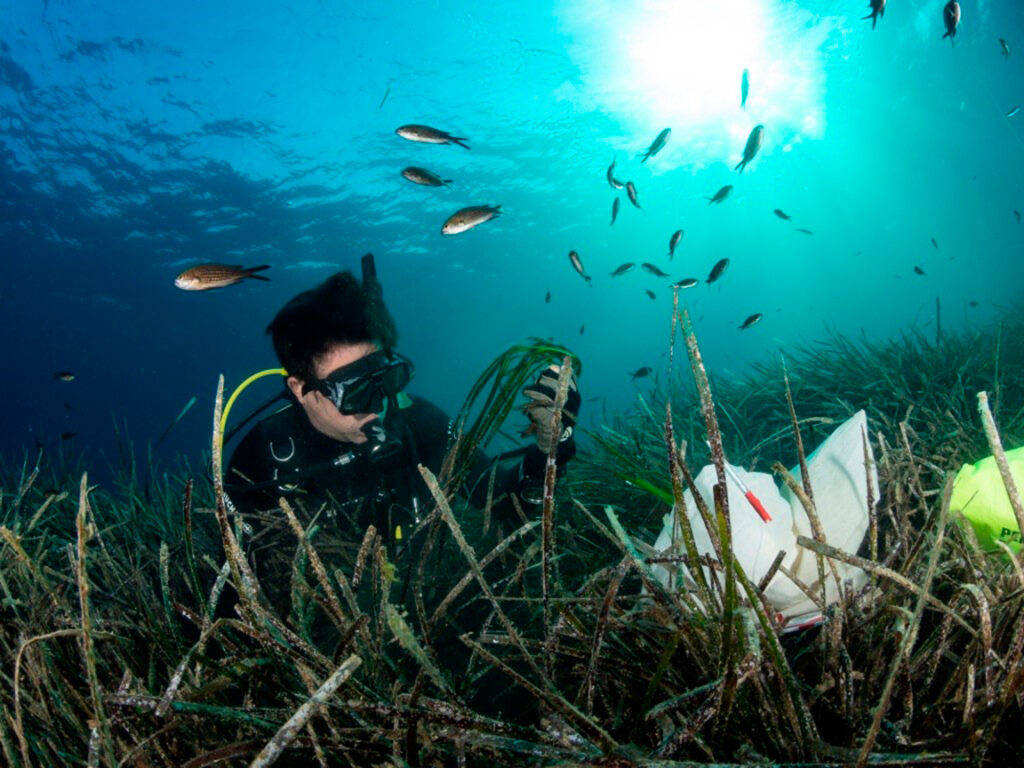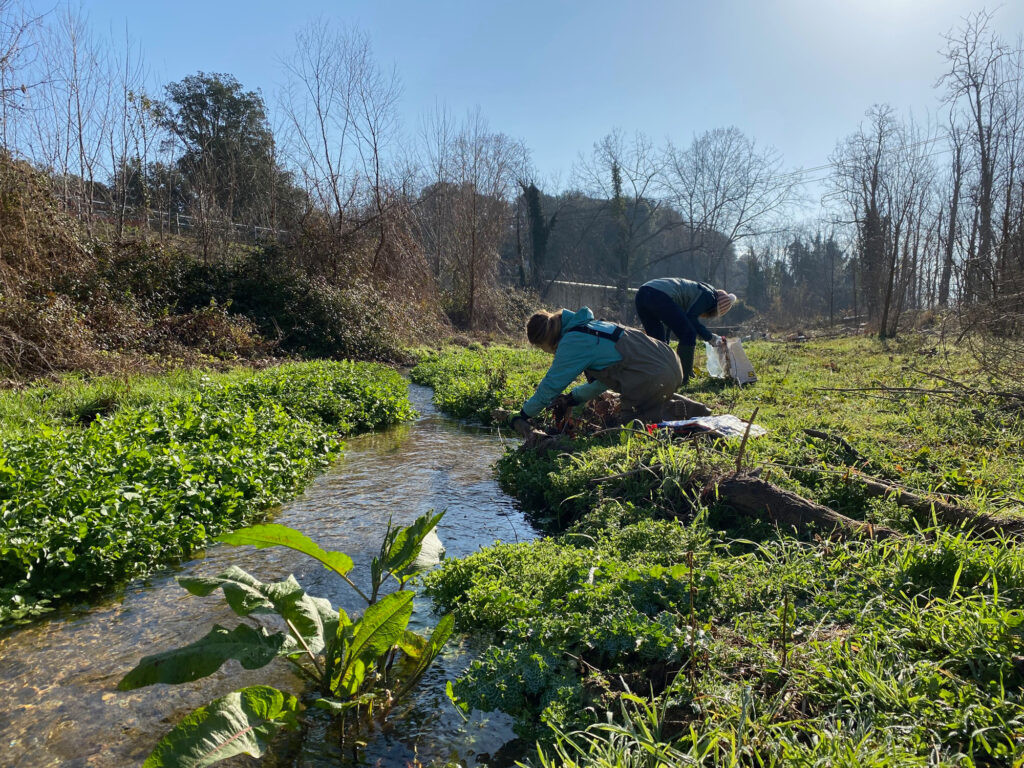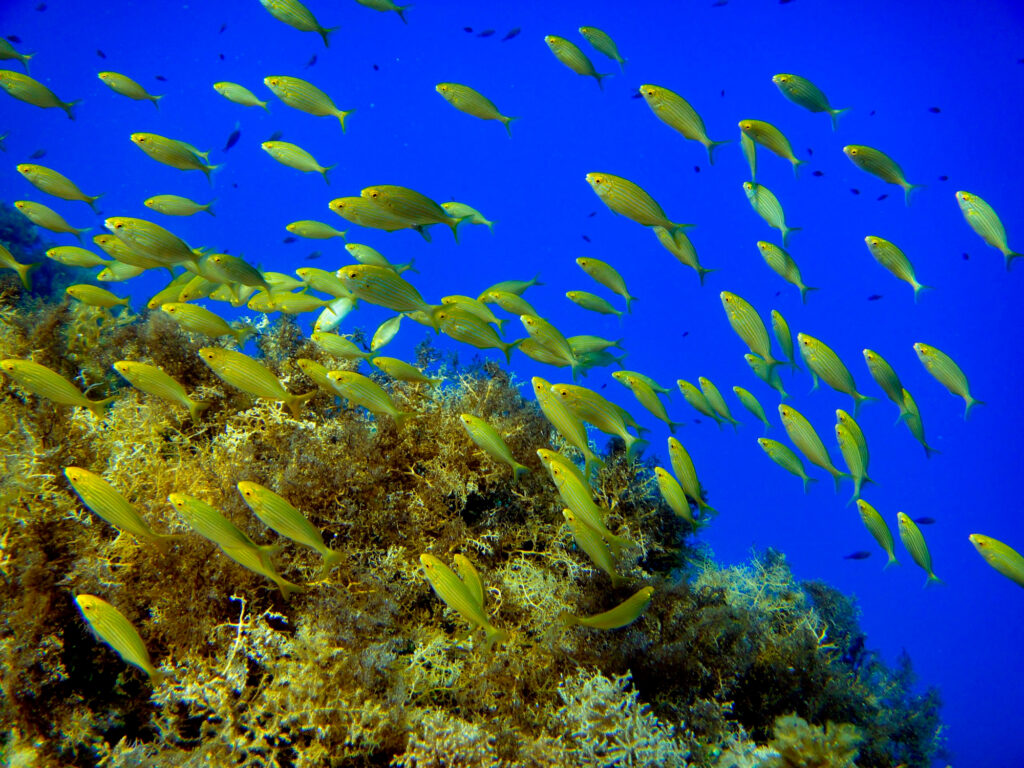El CEAB
Organisation and Team
Departments and research groups
DEPARTMENTS AND RESEARCH GROUPS

Department of Marine Ecology
Researchers in the department work across a diverse range of fields in biology and environmental sciences, including nutrient dynamics (such as carbon) in the marine environment, biodiversity and its evolution, ecosystem functioning, human integration into ecosystems (socio-ecology), our impacts, and what is happening and what is expected to occur with global change. The management, conservation and restoration of marine and coastal ecosystems play a significant role. Approaches employed to delve into these fields include in-situ and wet-lab experimentation, spatial gradient approaches, maintaining temporal series, and modelling. The methodologies used encompass molecular and biochemical techniques, stable isotope utilisation and landscape ecology.
Research groups
Head: Dr. Emma Cebrian–Dr. Teresa Alcoverro
The group strives to understand the patterns and processes underlying the structure and functioning of the marine benthos, across multiple temporal and spatial scales, and in various environmental settings. Our team combines descriptive field ecology and natural history with experimental and modelling approaches to comprehend the factors regulating species, communities, and ecosystems. Additionally, we work to determine how benthic ecosystems may be influenced by human disturbances on a local, regional and global scale. Primary ecosystems studied include shallow rocky bottoms and seagrass meadows across a wide distribution area: Mediterranean Sea, Atlantic, Indian, and Pacific Oceans, Gulf of California, and the Caribbean Sea.
Head: Dr. Xavier Turon
The main objective of the group is to employ molecular tools (genes, proteins and secondary metabolites) to assess evolutionary and ecological processes in benthic systems, addressing questions that could not otherwise be tackled. The aim is to understand the diversity and functioning of the marine benthos, and to predict changes occurring in response to environmental alterations (whether natural or induced by humans).
Key study topics include:
- Taxonomy and phylogeny (morphological and molecular) of benthic species (with emphasis on sponges, polychaetes, crustaceans, ascidians and fish) and organism assemblages (metagenetics).
- Life cycles: reproduction, growth and differential gene expression throughout the life cycle.
- Species dispersal, adaptation/selection, population genetics, and the demography and phylogeography of native and introduced species.
- Marine symbiosis, involving micro- and macroorganisms: from molecular, biological and ecological perspectives.
- Production of secondary metabolites by marine benthic organisms: ecological functions and biotechnological applications.
- Differential gene expression of benthic organisms under changing environmental conditions (molecular, biological and ecological responses).
Head: Dr. Miguel Ángel Mateo – Dr. Òscar Serrano
The group’s general research objectives encompass three main areas:
- Aquatic macrophyte ecology in coastal marine environments (shallow areas of up to 40-50 metres deep, salty or brackish coastal lagoons, and estuaries).
- Biogeochemistry of ecosystems dominated by coastal vegetation, with particular emphasis on the carbon cycle and its implications as carbon sinks in a context of global warming (“Blue Carbon”).
- Paleoecology, Paleoclimatology and Paleoceanography in the Holocene Period, based on the sedimentary record analysis of the seagrass Posidonia oceanica.
As regards applied research, the group also focuses on three main areas:
- Environmental diagnosis and analysis of the suitability of coastal marine ecosystems, focusing on the use of aquatic macrophytes as environmental quality indicators.
- Quantification and study of mechanisms for monetising “Blue Carbon” (wetlands, marshes and seagrass meadows) to enhance the value of coastal vegetation ecosystem services (including the design and implementation of projects/mechanisms for clean development – CDMs).
- The development and testing of new technologies for the field of sampling and mapping of bottoms and sediments in coastal environments and transitional water masses (wetlands, coastal lagoons, wetlands and estuaries).
Head: Dr. Ana Gordoa
The group’s goal is to research – on conceptual and empirical grounds – how socio-ecological systems impact coastal and marine environments. We study this impact to optimise the use of these spaces.
The group is characterised by interdisciplinary knowledge sharing, providing a solid scientific basis for solving specific social sustainability issues within the current socio-ecological paradigm.
We are advancing research and its application at the interface between social and natural systems: how they function and interact, how to address current and emerging environmental problems (local and global), and the role that science and regulation could potentially play in addressing them.
The group has a long and successful history in coordinating international cooperation projects. Our core research topics include socio-ecological aspects, sustainable exploitation of marine resources, operational oceanography and fisheries (professional and recreational), coastal management and functional ecology.
Head: Dr. Manuel Maldonado
The group combines basic research objectives with potential practical applications. Research revolves around marine invertebrates, primarily sponges. This is a group of organisms of significant importance for various reasons: their important ecological role in several marine habitats; their great biotechnological potential; and their role as an evolutionary link between protozoa and metazoans.
The group’s goal is to generate basic knowledge with potential practical applications in three main areas:
- Eco-biology of silicification in marine sponges and its biotechnological application (researching the role of sponges in the biogeochemical cycle of crucial nutrients for primary production – especially silicate – in the bioremediation of organic and bacterial pollution in the water column, and as bioindicators of global environmental changes).
- Reproductive eco-biology and biotechnological application (cultivation of substances of interest in bioreactors, treatment of wastewater from fish farms).
- Evolutionary biology of basal metazoans. Various histological and cytological studies have led to exhaustive knowledge of these organisms. This knowledge is proving to be of great interest in the field of evolutionary biology, since it makes it possible to introduce hypotheses proposed from numerous molecular phylogenies in order to attempt to deduce the origin and initial evolution of basal groups of the animal kingdom.

Department of Ecology of Inland Waters
This department is devoted to the integrated study of ecosystems and species associated with freshwater environments. It works in a wide variety of research areas, adopting methodological approaches ranging from genomics to biogeochemistry, computational methodologies or the study of biodiversity and the biology of aquatic plants and animals. The topics we investigate in both our core and applied research have a strong social impact: the conservation of species and natural systems; challenges related to biodiversity and ecosystem services (such as self-purification capacity in rivers, or nutrient recycling) in the context of climate and global change.
Research groups
Head: Dr. Eugènia Martí
Freshwater ecosystems provide goods and services of great importance to society. However, they are among the most heavily altered ecosystems, with a proportionally greater loss of biodiversity.
The biogeochemistry of freshwater ecosystems is closely linked to terrestrial, atmospheric and climatic disturbances, being especially sensitive to the effects of global change.
The Integrative Freshwater Ecology research group addresses interactions between abiotic and biotic factors at different levels of qualitative and quantitative organisation, seeking a more comprehensive understanding of biodiversity and ecological processes.
Our expertise encompasses studies ranging from microbes to macrophytes and fish, as well as research related to the biogeochemical cycles of carbon, nitrogen, phosphorus and sulphur.
We employ cutting-edge analytical methodologies in genetics, ecology, computational biology and chemistry, as well as conducting observational and experimental exploratory research on broad spatial and temporal scales.

Department of Ecology and Complexity
Ecological dynamics are highly complex and often non-linear, with feedback phenomena and emergent properties that make prediction a challenge. Understanding them requires integrating knowledge from various disciplines such as ecology, biology, physics, mathematics, and social sciences. At the department, we work to integrate these fields and use state-of-the-art modeling tools based on real data to understand the functioning of ecological processes.
We are a multidisciplinary team focused on population ecology, community ecology and biodiversity, behavioral and movement ecology, invasion biology, and epidemiology. We examine ecosystem complexities by studying interactions between organisms and their environments, using tools such as field monitoring, sophisticated experiments, computational models, and mathematical frameworks to investigate ecological systems as adaptive complex entities. This approach allows us to identify common patterns across different systems and deepen our understanding of ecological responses in ever-changing natural environments, including impacts on human health.
Research groups
Head: Dr. Frederic Bartumeus
We are a collaborative and multidisciplinary team. Our research examines the complexities of ecosystems by studying interactions between organisms and their environments.
Research lines:
- Predictive Microbial Ecology
- Microbiome engineering
- Collective behaviour
- Animal movement
- Animal behaviour in a changing world
- Vector and disease ecology
- Non-linear responses in ecology
- Resilience and life-history strategies
- Individual heterogeneity in natural populations
- Biodiversity, stability, human resource exploitation


